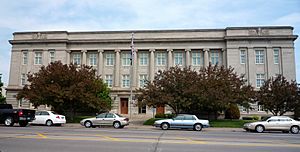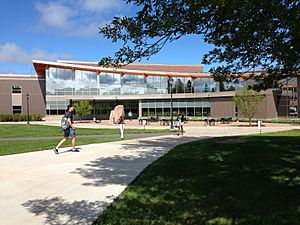Superior, Wisconsin facts for kids
Quick facts for kids
Superior, Wisconsin
|
|
|---|---|
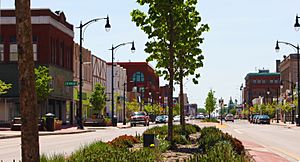
Downtown Superior
|
|
| Nickname(s):
Twin Ports (with Duluth)
|
|
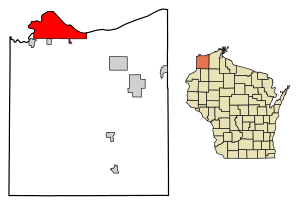
Location of the city of Superior
in Douglas County, Wisconsin |
|
| Country | United States |
| State | Wisconsin |
| County | Douglas |
| Incorporated | September 6, 1854 |
| Area | |
| • Total | 45.36 sq mi (117.47 km2) |
| • Land | 36.62 sq mi (94.85 km2) |
| • Water | 8.74 sq mi (22.63 km2) |
| Population
(2020)
|
|
| • Total | 26,751 |
| • Density | 709.35/sq mi (273.88/km2) |
| Time zone | UTC−6 (CST) |
| • Summer (DST) | UTC−5 (CDT) |
| ZIP codes |
54880
|
| Area code(s) | 715 and 534 |
| FIPS code | 55-78650 |
Superior (/sʊˈpɪr.i.ər/) is a city in Wisconsin, United States. It is the main city of Douglas County. In 2020, about 26,751 people lived there.
Superior is located at the western end of Lake Superior. It sits where two major roads, U.S. Route 2 and U.S. Route 53, meet. The city is next to the Village of Superior and the Town of Superior.
The city is surrounded by three bays: Saint Louis, Superior, and Allouez. Two rivers, the Nemadji and the Saint Louis, flow nearby. Superior and Duluth, Minnesota, which is across the bay, are known as the Twin Ports. They share a very important harbor on the Great Lakes. Both cities have old ships that are now museums, like the SS William A. Irvin in Duluth and the SS Meteor in Superior. These ships teach visitors about the area's history with boats. Superior is an industrial city with busy ship harbors, large train yards, an oil refinery, and a shipyard.
Contents
Superior's History
The first log cabin in Superior was built in September 1853. This happened at the same time that work began on the locks and ship canal at Sault Ste. Marie, Michigan. These locks were built to help ships get around rapids. Superior officially became a city on March 25, 1889. It also became the main city for the new Douglas County.
People in Superior were excited about building a railroad from Lake Superior to the Pacific Coast. Many people invested money, but then a financial crisis called the Panic of 1857 hit. Investment slowed down, and the city's population dropped from 2,500 to 500 people.
About 25 years later, the Northern Pacific Railway and other train lines finally arrived. This made the dream of a rail and water route across the country come true. In 1883, General John H. Hammond started the Land and River Improvement Company. This company helped build much of West Superior, including an iron and steel factory. Many businesses dealing with grain, coal, and lumber also started around this time.
Between 1888 and 1892, Superior had a big growth period. The Land and River Improvement Company and others built impressive buildings on Tower Avenue. They saw Superior as the "new Chicago." Many investors were from the eastern United States, so buildings were named after states like the New Jersey Block. By 1892, the city's population grew to 34,000. However, another financial crisis, the Panic of 1893, slowed development again.
From 1890 to 1920, many people moved to Superior. They came from the eastern United States and over 15 other countries. These countries included England, Scotland, Ireland, Norway, Sweden, Finland, Belgium, Poland, Germany, Italy, Hungary, and Croatia.
Superior's Location and Climate
Superior covers about 55.65 square miles (144.1 square kilometers). About 36.96 square miles (95.7 square kilometers) is land, and 18.69 square miles (48.4 square kilometers) is water. Most of Superior is flat, with a gentle slope towards Lake Superior.
Weather in Superior
Superior has a climate with warm summers and cold, snowy winters.
| Climate data for Superior, Wisconsin (1991–2020 normals, extremes 1909–present) | |||||||||||||
|---|---|---|---|---|---|---|---|---|---|---|---|---|---|
| Month | Jan | Feb | Mar | Apr | May | Jun | Jul | Aug | Sep | Oct | Nov | Dec | Year |
| Record high °F (°C) | 55 (13) |
60 (16) |
80 (27) |
92 (33) |
96 (36) |
98 (37) |
105 (41) |
99 (37) |
97 (36) |
89 (32) |
79 (26) |
60 (16) |
105 (41) |
| Mean daily maximum °F (°C) | 22.5 (−5.3) |
26.9 (−2.8) |
36.1 (2.3) |
46.0 (7.8) |
57.4 (14.1) |
67.0 (19.4) |
76.1 (24.5) |
74.8 (23.8) |
66.6 (19.2) |
53.0 (11.7) |
39.1 (3.9) |
27.3 (−2.6) |
49.4 (9.7) |
| Daily mean °F (°C) | 14.1 (−9.9) |
18.0 (−7.8) |
28.5 (−1.9) |
38.9 (3.8) |
49.1 (9.5) |
58.2 (14.6) |
67.1 (19.5) |
66.4 (19.1) |
58.4 (14.7) |
45.8 (7.7) |
32.4 (0.2) |
20.2 (−6.6) |
41.4 (5.2) |
| Mean daily minimum °F (°C) | 5.8 (−14.6) |
9.1 (−12.7) |
21.0 (−6.1) |
31.8 (−0.1) |
40.9 (4.9) |
49.5 (9.7) |
58.0 (14.4) |
58.0 (14.4) |
50.1 (10.1) |
38.6 (3.7) |
25.6 (−3.6) |
13.1 (−10.5) |
33.5 (0.8) |
| Record low °F (°C) | −37 (−38) |
−38 (−39) |
−38 (−39) |
−2 (−19) |
11 (−12) |
25 (−4) |
34 (1) |
31 (−1) |
19 (−7) |
9 (−13) |
−19 (−28) |
−32 (−36) |
−38 (−39) |
| Average precipitation inches (mm) | 0.81 (21) |
0.89 (23) |
1.41 (36) |
2.64 (67) |
3.37 (86) |
4.56 (116) |
3.88 (99) |
3.92 (100) |
3.39 (86) |
3.17 (81) |
2.12 (54) |
1.29 (33) |
31.45 (799) |
| Average snowfall inches (cm) | 14.5 (37) |
12.4 (31) |
9.1 (23) |
1.7 (4.3) |
0.0 (0.0) |
0.0 (0.0) |
0.0 (0.0) |
0.0 (0.0) |
0.0 (0.0) |
0.2 (0.51) |
5.8 (15) |
12.3 (31) |
56.0 (142) |
| Average precipitation days (≥ 0.01 in) | 7.1 | 5.6 | 7.1 | 8.8 | 11.6 | 11.5 | 10.4 | 9.6 | 9.9 | 9.7 | 8.1 | 7.0 | 106.4 |
| Average snowy days (≥ 0.1 in) | 6.8 | 5.2 | 3.7 | 1.6 | 0.0 | 0.0 | 0.0 | 0.0 | 0.0 | 0.1 | 3.1 | 5.7 | 26.2 |
| Source: NOAA | |||||||||||||
People of Superior
| Historical population | |||
|---|---|---|---|
| Census | Pop. | %± | |
| 1890 | 11,983 | — | |
| 1900 | 31,091 | 159.5% | |
| 1910 | 40,384 | 29.9% | |
| 1920 | 39,671 | −1.8% | |
| 1930 | 36,133 | −8.9% | |
| 1940 | 35,136 | −2.8% | |
| 1950 | 35,325 | 0.5% | |
| 1960 | 33,563 | −5.0% | |
| 1970 | 32,237 | −4.0% | |
| 1980 | 29,571 | −8.3% | |
| 1990 | 27,134 | −8.2% | |
| 2000 | 27,368 | 0.9% | |
| 2010 | 27,244 | −0.5% | |
| 2020 | 26,751 | −1.8% | |
| U.S. Decennial Census 2020 census |
|||
In 2020, Superior had 26,751 residents. Most people (87.7%) were White. Other groups included Native American (2.1%), Black or African American (1.8%), and Asian (0.9%). About 6.7% of residents were from two or more races. About 2.1% of the population was Hispanic or Latino.
Superior's Economy
The transportation industry provides over 1,000 jobs in Superior. The Twin Ports of Duluth–Superior is the largest port on the Great Lakes. It handles many types of goods, especially bulk solids like grain. The large silos for grain storage can be seen along the Superior waterfront. In 2004, the port shipped out more than 41.4 million metric tons of goods. BNSF Railway also has a major operations center in Superior.
Cenovus Energy runs an oil refinery in Superior. This refinery is part of a pipeline system that connects western Canada to the Midwest. In 2018, there was an explosion at the refinery. This led to an evacuation of local residents due to heavy smoke.
Other growing businesses in the area include FenTech, Inc., which makes vinyl doors and windows. Charter NEX Films produces plastic films, and Genesis Attachments makes tools like shears and grapples. Amsoil creates synthetic motor oil, and Crane Song Ltd. makes electronics for recording studios. Fraser Shipyards also employs many people, repairing and upgrading commercial ships.
Arts and Culture in Superior
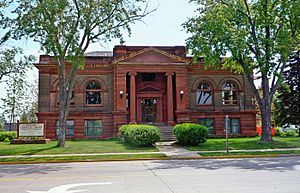
The Superior Public Library is located in downtown Superior.
Superior City FC is a semi-professional soccer club. They play in the United Premier Soccer League (UPSL). The club has men's and women's teams, along with amateur adult teams. Their home games are played at the NBC Spartan Sports Complex at Superior Senior High School.
Parks and Recreation
Superior has several parks. One notable park is the second largest city-owned forest in the United States. It is located in the Billings Park neighborhood.
Education in Superior
The Superior School District serves the city's students. It includes one high school, one middle school, and six elementary schools. Over 5,000 students attend these schools. Superior High School has more than 1,500 students, and its mascot is Sparty the Spartan. The Maple School District also enrolls over 1,400 students.
There are also private schools in Superior. These include the Catholic Cathedral School, Maranatha Academy (Protestant-based), and Twin Ports Baptist School.
The University of Wisconsin–Superior (UWS) is a public college. It started as a school for training teachers and became part of the University of Wisconsin System in 1971.
Northwood Technical College (formerly WITC) offers training and technical education. Over 2,200 students attend this college.
Media in Superior
Print Media
- The Superior Telegram: A local newspaper published twice a week.
- The Superior Catholic Herald: A newspaper published by the Roman Catholic Diocese of Superior.
- Positively Superior: A magazine published every two months that focuses on businesses in Superior and Douglas County.
Radio Stations
Superior is part of the Duluth radio and television market.
- KDKE 102.5 FM – Plays classic Country music.
- KUWS 91.3 FM – Part of the Ideas network of Wisconsin Public Radio.
- WDSM 710 AM – News Talk Information.
- WDUL 970 AM – Sports radio.
- WGHF-LP 93.7 FM – Broadcasts for the Superior Seventh-Day Adventist Church.
- WSSU (FM) 88.5 FM – Part of WPR News & Classical.
Television Stations
- 6 KBJR-TV (NBC/CBS) – Superior
- 3 KDLH (The CW) – Duluth
- 8 WDSE (PBS) – Duluth
- 10 WDIO-DT (ABC) – Duluth
- 21 KQDS (Fox) – Duluth
- 27 KCWV (Family Chanel) – Duluth
Transportation in Superior
Highways
Several important highways pass through Superior:
 Interstate 535 – Known as the John Blatnik Bridge.
Interstate 535 – Known as the John Blatnik Bridge. U.S. Highway 2 – Runs along Belknap Street and E. 2nd Street.
U.S. Highway 2 – Runs along Belknap Street and E. 2nd Street. U.S. Highway 53
U.S. Highway 53 Wisconsin Highway 35 – Runs along Tower Avenue.
Wisconsin Highway 35 – Runs along Tower Avenue. Wisconsin Highway 105 – Runs along Central Avenue.
Wisconsin Highway 105 – Runs along Central Avenue.
Airports
Richard I. Bong Airport (KSUW) serves Superior and nearby towns. The closest airport with commercial flights is Duluth International Airport in Duluth.
Bus Service
The Duluth Transit Authority offers public bus service in Superior and Duluth. Indian Trails provides bus service to other cities.
Train Service
There are plans for a new Amtrak train route called the Northern Lights Express. This route would run between Duluth and the Twin Cities. Superior would be a planned stop on this route. Superior used to have passenger train service until 1984 at the Superior Union Station.
Notable People from Superior
- Richard Bong: A Medal of Honor winner and the top flying ace for the U.S. in World War II.
- Esther Bubley: A famous photographer.
- Solanus Casey: A priest who is considered "blessed" by the Catholic Church.
- Bud Grant: A well-known football coach for the Minnesota Vikings.
- Eastman Johnson: An artist who helped start the Metropolitan Museum of Art.
- Ernie Nevers: A football player in both the College and Pro Football Halls of Fame.
- Marian Nixon: An actress.
- Jeffrey Williams: A NASA astronaut.
- Oliver E. Williamson: Won the 2009 Nobel Prize in economics.
Religion in Superior
Superior is the main city for the Roman Catholic Diocese of Superior. The Cathedral of Christ the King is the most important church in the diocese. Saint Francis Xavier Catholic Church is known for its beautiful architecture. Christ Evangelical Lutheran Church is the only church of the Lutheran Church Missouri Synod in Superior. Pilgrim Lutheran Church is located near the University of Wisconsin–Superior.
United Presbyterian Church was formed when three churches merged into a new building. Faith United Methodist Church also resulted from a merger of three Methodist Churches. Many other small churches are found throughout the city's neighborhoods, representing different Christian groups.
Images for kids
-
1915 panoramic map of the Twin Ports, Superior on the left and Duluth on the right
See also
 In Spanish: Superior (Wisconsin) para niños
In Spanish: Superior (Wisconsin) para niños
 | Chris Smalls |
 | Fred Hampton |
 | Ralph Abernathy |




